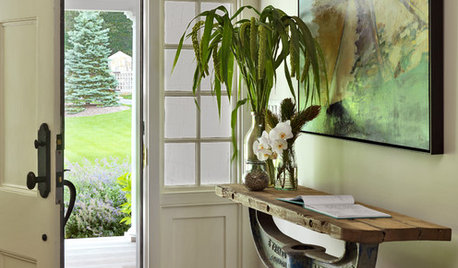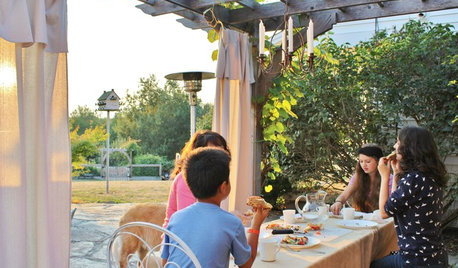Anyone homesteading without a 'real job'?
mamahobby
17 years ago
Related Stories

BUDGET DECORATINGThe Cure for Houzz Envy: Entryway Touches Anyone Can Do
Make a smashing first impression with just one or two affordable design moves
Full Story
BEDROOMSThe Cure for Houzz Envy: Master Bedroom Touches Anyone Can Do
Make your bedroom a serene dream with easy moves that won’t give your bank account nightmares
Full Story
CLOSETSThe Cure for Houzz Envy: Closet Touches Anyone Can Do
These easy and inexpensive moves for more space and better organization are right in fashion
Full Story
BUDGET DECORATINGThe Cure for Houzz Envy: Living Room Touches Anyone Can Do
Spiff up your living room with very little effort or expense, using ideas borrowed from covetable ones
Full Story
LAUNDRY ROOMSThe Cure for Houzz Envy: Laundry Room Touches Anyone Can Do
Make fluffing and folding more enjoyable by borrowing these ideas from beautifully designed laundry rooms
Full Story
HOUZZ TOURSMy Houzz: A Modern-Day Homestead Brings a Family Together
Their 5-acre Washington property, with sports court, swings, pizza oven and gardens, is a labor of love and communal playspace
Full Story
CHRISTMASReal vs. Fake: How to Choose the Right Christmas Tree
Pitting flexibility and ease against cost and the environment can leave anyone flummoxed. This Christmas tree breakdown can help
Full Story
HOME TECHNew TV Remote Controls Promise to Do More — Without the Struggle
Dim your lights, set up user profiles and discover a remote you can't lose. Welcome to the latest and greatest way to change the channel
Full Story
DECORATING GUIDESQuick Fix: Find Wall Studs Without an Expensive Stud Finder
See how to find hidden wall studs with this ridiculously easy trick
Full Story
DECORATING GUIDESLook-Alikes That Save Money Without Skimping on Style
Whether in woodwork, flooring, wall treatments or tile, you can get a luxe effect while spending less
Full StorySponsored






sharon_sd
joel_bc
Related Professionals
Allentown Landscape Architects & Landscape Designers · Deer Park Landscape Architects & Landscape Designers · Manhattan Beach Landscape Architects & Landscape Designers · Waunakee Landscape Architects & Landscape Designers · Wixom Landscape Architects & Landscape Designers · Tempe Landscape Contractors · Addison Landscape Contractors · Essex Landscape Contractors · Matteson Landscape Contractors · Pleasanton Landscape Contractors · Stallings Landscape Contractors · Vacaville Landscape Contractors · Maplewood Landscape Contractors · Lawrenceville Siding & Exteriors · Leesburg Siding & ExteriorsPooh Bear
gurley157fs
farmfreedom
joel_bc
cottagehome2006
huisjen